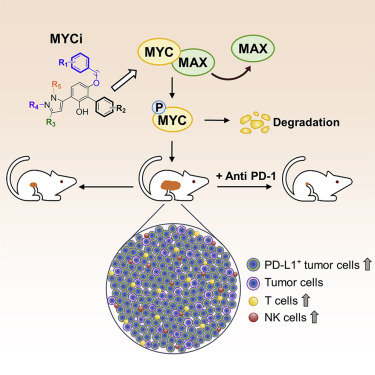当前位置:
X-MOL 学术
›
Cancer Cell
›
论文详情
Our official English website, www.x-mol.net, welcomes your
feedback! (Note: you will need to create a separate account there.)
Small-Molecule MYC Inhibitors Suppress Tumor Growth and Enhance Immunotherapy.
Cancer Cell ( IF 48.8 ) Pub Date : 2019-10-31 , DOI: 10.1016/j.ccell.2019.10.001 Huiying Han 1 , Atul D Jain 2 , Mihai I Truica 1 , Javier Izquierdo-Ferrer 2 , Jonathan F Anker 1 , Barbara Lysy 1 , Vinay Sagar 1 , Yi Luan 1 , Zachary R Chalmers 1 , Kenji Unno 1 , Hanlin Mok 1 , Rajita Vatapalli 1 , Young A Yoo 1 , Yara Rodriguez 1 , Irawati Kandela 3 , J Brandon Parker 4 , Debabrata Chakravarti 5 , Rama K Mishra 6 , Gary E Schiltz 7 , Sarki A Abdulkadir 8
Cancer Cell ( IF 48.8 ) Pub Date : 2019-10-31 , DOI: 10.1016/j.ccell.2019.10.001 Huiying Han 1 , Atul D Jain 2 , Mihai I Truica 1 , Javier Izquierdo-Ferrer 2 , Jonathan F Anker 1 , Barbara Lysy 1 , Vinay Sagar 1 , Yi Luan 1 , Zachary R Chalmers 1 , Kenji Unno 1 , Hanlin Mok 1 , Rajita Vatapalli 1 , Young A Yoo 1 , Yara Rodriguez 1 , Irawati Kandela 3 , J Brandon Parker 4 , Debabrata Chakravarti 5 , Rama K Mishra 6 , Gary E Schiltz 7 , Sarki A Abdulkadir 8
Affiliation

|
Small molecules that directly target MYC and are also well tolerated in vivo will provide invaluable chemical probes and potential anti-cancer therapeutic agents. We developed a series of small-molecule MYC inhibitors that engage MYC inside cells, disrupt MYC/MAX dimers, and impair MYC-driven gene expression. The compounds enhance MYC phosphorylation on threonine-58, consequently increasing proteasome-mediated MYC degradation. The initial lead, MYC inhibitor 361 (MYCi361), suppressed in vivo tumor growth in mice, increased tumor immune cell infiltration, upregulated PD-L1 on tumors, and sensitized tumors to anti-PD1 immunotherapy. However, 361 demonstrated a narrow therapeutic index. An improved analog, MYCi975 showed better tolerability. These findings suggest the potential of small-molecule MYC inhibitors as chemical probes and possible anti-cancer therapeutic agents.
中文翻译:

小分子 MYC 抑制剂抑制肿瘤生长并增强免疫治疗。
直接靶向 MYC 并且在体内也具有良好耐受性的小分子将提供宝贵的化学探针和潜在的抗癌治疗剂。我们开发了一系列小分子 MYC 抑制剂,这些抑制剂可与细胞内的 MYC 结合,破坏 MYC/MAX 二聚体,并损害 MYC 驱动的基因表达。这些化合物增强了苏氨酸 58 上的 MYC 磷酸化,从而增加了蛋白酶体介导的 MYC 降解。最初的先导药物 MYC 抑制剂 361 (MYCi361) 抑制小鼠体内肿瘤生长,增加肿瘤免疫细胞浸润,上调肿瘤上的 PD-L1,并使肿瘤对抗 PD1 免疫疗法敏感。然而,361 表现出狭窄的治疗指数。改进的类似物 MYCi975 显示出更好的耐受性。
更新日期:2019-11-09
中文翻译:

小分子 MYC 抑制剂抑制肿瘤生长并增强免疫治疗。
直接靶向 MYC 并且在体内也具有良好耐受性的小分子将提供宝贵的化学探针和潜在的抗癌治疗剂。我们开发了一系列小分子 MYC 抑制剂,这些抑制剂可与细胞内的 MYC 结合,破坏 MYC/MAX 二聚体,并损害 MYC 驱动的基因表达。这些化合物增强了苏氨酸 58 上的 MYC 磷酸化,从而增加了蛋白酶体介导的 MYC 降解。最初的先导药物 MYC 抑制剂 361 (MYCi361) 抑制小鼠体内肿瘤生长,增加肿瘤免疫细胞浸润,上调肿瘤上的 PD-L1,并使肿瘤对抗 PD1 免疫疗法敏感。然而,361 表现出狭窄的治疗指数。改进的类似物 MYCi975 显示出更好的耐受性。











































 京公网安备 11010802027423号
京公网安备 11010802027423号